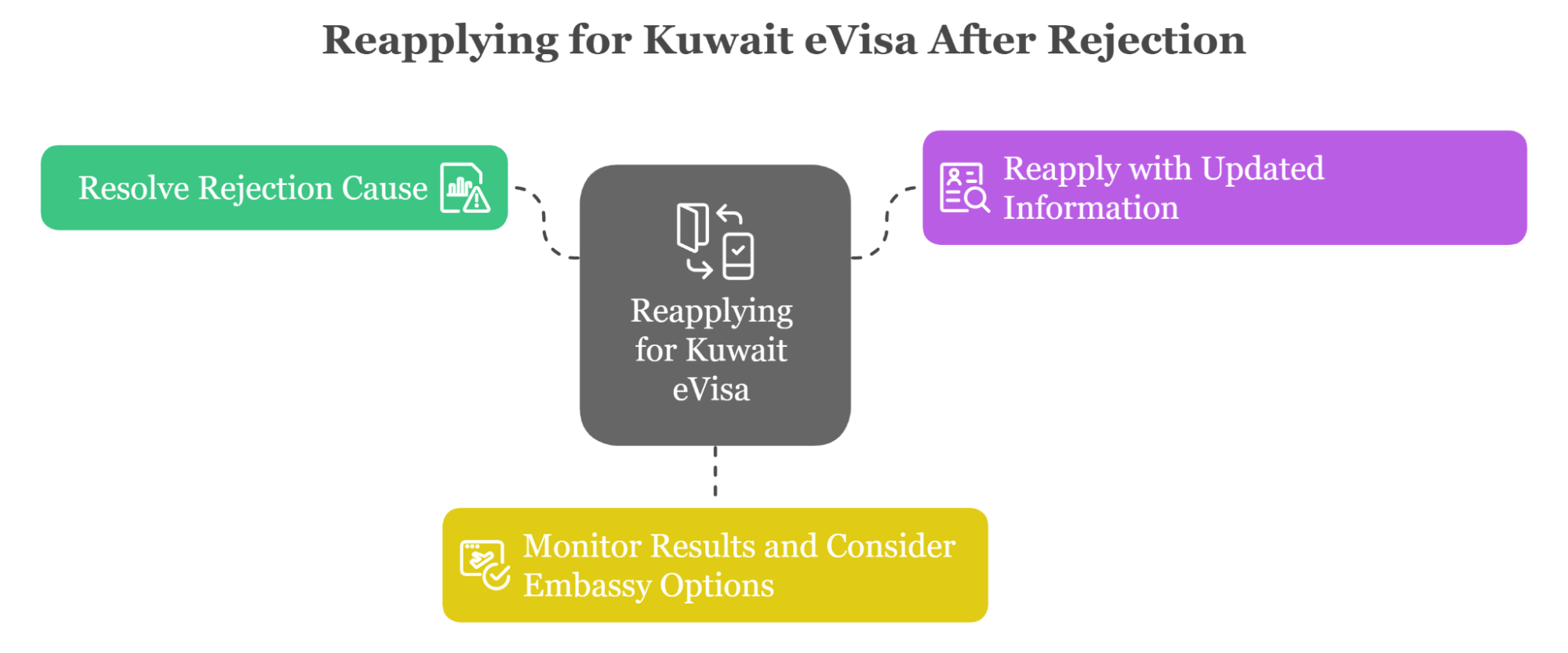The Kuwait e-Visa offers a convenient way for travelers to enter the country, but not all applications are approved.
In this guide, we’ll walk you through the reasons for e-Visa rejection and provide practical solutions to help you address them.
Understanding these factors is key to ensuring a successful reapplication and avoiding common mistakes in the future. To improve your chances of approval, it’s essential to review all requirements carefully and apply for Kuwait Visa through the official platform with accurate and complete documentation.

What is the Kuwait eVisa?
The Kuwait eVisa (electronic visa) is an official travel authorization that allows eligible foreign nationals to enter Kuwait for short stays, typically for tourism or business purposes.
The application is completed entirely online, eliminating the need to visit a Kuwaiti embassy or consulate.
Key Features of the Kuwait eVisa
- Eligibility: Available to citizens of select countries (including the U.S., EU member states, GCC residents, etc.).
- Validity: Usually valid for 30 days after issuance, allowing a stay of up to 30 days in Kuwait.
- Single Entry: The eVisa typically permits one entry into the country.
- Processing Time: Applications are generally processed within 1 to 3 business days.
- Entry Point: Must enter Kuwait via Kuwait International Airport when using an eVisa.
Who Should Apply for the Kuwait eVisa?
The Kuwait eVisa is intended for travelers who meet specific criteria based on nationality, purpose of visit, and intended length of stay. You should apply for the Kuwait eVisa if:
✅ You are a citizen of an eligible country
✅ You plan to visit Kuwait for tourism or short business purposes
✅ You intend to stay in Kuwait for a short period
✅ You are entering via Kuwait International Airport
Common Reasons for Kuwait eVisa Rejection
Applying for a Kuwait eVisa is typically a smooth process, but applications can still be denied for several preventable reasons.
Understanding the most common rejection factors can help applicants avoid delays and improve their chances of approval.
Below, we outline the key reasons why an eVisa application might be rejected, covering everything from documentation issues to eligibility mismatches.
1. Inaccurate or Incomplete Information
Errors in the application form—such as incorrect passport numbers, misspelled names, or incomplete sections, are a primary reason for rejection. The system cross-checks details with official records, and any mismatch can lead to automatic denial.
2. Invalid or Expired Passport
A passport must be valid for at least six months beyond the date of entry into Kuwait. Applications submitted with expired, damaged, or soon-to-expire passports are not accepted and will be rejected.
3. Ineligibility Based on Nationality
Only travelers from approved countries or GCC residents with qualifying professions are eligible for the eVisa. Applicants from restricted nationalities must apply through a Kuwaiti embassy and are not eligible for the online process.
4. Poor Document Quality
Uploading low-resolution or unreadable documents, such as passport scans or photos, can result in rejection. Clear, properly formatted documents are essential for identity and eligibility verification.
5. History of Visa Violations
Applicants who have previously overstayed a visa in Kuwait or violated immigration rules are likely to face rejection. Such records can affect future applications regardless of current eligibility.
6. Unclear Travel Purpose or Suspicious Intentions
If your stated reason for travel is vague, inconsistent, or doesn’t align with the eVisa type, it may raise concerns. Suspicious patterns in travel history can also lead to refusal.
7. Criminal Record or Security Concerns
Applications are screened for security risks. Individuals flagged by international databases or with known criminal records may be denied entry as part of Kuwait’s national security measures.
8. Duplicate or Frequent Applications
Repeated submissions without addressing the reasons for a previous denial can lead to further rejections. The system may treat frequent or duplicate applications as suspicious behavior.
9. GCC Resident Profession Mismatch
GCC residents must have a profession listed among those approved by Kuwaiti authorities. If the occupation on your residence permit does not meet the criteria, your application will not be approved.
How to Avoid Kuwait eVisa Rejection
To maximize your chances of a successful Kuwait eVisa application, it is crucial to address potential issues proactively. Below are the recommended actions to prevent common reasons for eVisa rejection:
✅ Verify All Application Information
Ensure that all personal details, including your name, passport number, and date of birth, are accurately entered, matching the information on your passport. Even minor discrepancies can result in automatic rejection.
✅ Ensure Passport Validity
Your passport must be valid for at least six months from the date of intended entry into Kuwait. Additionally, ensure the passport is undamaged and readable to avoid delays in processing.
✅ Confirm Eligibility Before Submission
Review Kuwait’s official eVisa eligibility criteria to confirm that your nationality qualifies for the eVisa. GCC residents should ensure their profession is listed in the approved categories by Kuwait’s authorities.
✅ Submit High-Quality Documents
Upload clear, high-resolution copies of your passport and any required documents. Avoid submitting blurred or cropped images, and ensure the files meet the size and format specifications provided by the application portal.
✅ Resolve Any Previous Visa Violations
If you have overstayed a previous visa or violated Kuwait’s immigration rules, contact the relevant authorities for clarification before submitting a new application. Resolving past issues is essential for a successful application.
✅ Clearly Define Your Travel Purpose
Your travel purpose should be clearly stated(e.g., tourism, business). Inconsistent or vague explanations may lead to rejection.
✅ Disclose Criminal History Accurately
Be transparent about any past criminal offenses, if applicable. While some offenses may not disqualify you, providing inaccurate information will lead to automatic denial and potential future bans.
✅ Avoid Duplicate Applications
Do not submit multiple applications for the same trip. If your previous application was rejected, address the underlying issues before reapplying to avoid further complications.
What to Do After a Kuwait eVisa Rejection
Receiving a rejection for your Kuwait eVisa can be frustrating, but it does not mean your travel plans must end. Understanding the reason for denial and taking the right steps can help you correct the issue and reapply successfully.
- Review the Rejection Notice Carefully: Begin by reading the rejection email or notification thoroughly. While the exact reason may not always be detailed, you can often identify whether it relates to documentation, eligibility, or application errors.
- Identify and Correct the Problem: Based on the likely reason for rejection, take steps to address the issue. For example:If it was a document issue, prepare new, high-quality scans. If ineligibility was the reason, check updated criteria or consult your nearest Kuwaiti embassy.
- Wait Before Reapplying (if applicable): Avoid submitting a new application immediately, especially if the previous issue hasn’t been resolved. Some systems may automatically reject repeated applications made without changes.
- Consider Applying Through the Embassy: If your eVisa was rejected and you are not eligible to reapply online, you may still qualify for a visa through the nearest Kuwaiti embassy or consulate. This process may involve an in-person interview and additional documentation.
- Seek Professional Assistance: If you are unsure why your application was denied or how to proceed, consider seeking help from a licensed travel agent or visa consultant who is experienced with Kuwait’s immigration requirements.
- Maintain Accurate Records for Reapplication: Keep all your application records, including the rejection message, passport scans, and submitted documents. These can help you identify past errors and prepare a stronger case when reapplying.
Reapplying for a Kuwait eVisa After Rejection
A Kuwait eVisa rejection doesn’t mean your travel plans must end. If you’ve identified and fixed the issue that caused the denial, you can successfully reapply. Here’s a simple and professional 3-step guide to help you through the process.
Step 1: Resolve the Rejection Cause
Carefully review the reason your application was denied. Common causes include incorrect personal details, poor-quality document uploads, or eligibility mismatches. Ensure all your information is correct and your documents are clear, valid, and properly formatted before submitting a new application.
Step 2: Reapply with Updated Information
Wait a few days before reapplying. When you do, make sure to use accurate and updated details. Upload high-quality, correctly formatted documents, and ensure your travel purpose aligns with the visa. Reapply through the Kuwait eVisa portal and pay the visa fee again.
Step 3: Monitor Results and Consider Embassy Options
After submitting, regularly check your email and the eVisa portal for updates. If your application is rejected again or you become ineligible for an eVisa, you may apply for a traditional visa through a Kuwaiti embassy or consulate.

How to Contact Kuwait eVisa Support After a Rejected Application
If your Kuwait eVisa application has been denied and you need clarification or assistance, there are several ways to reach the appropriate support channels. Taking the right steps can help resolve the issue and guide your next application.
- Email the Ministry of Interior: Send a clear, respectful email with your full name, passport number, nationality, and application reference number (if available). Briefly explain your issue.
- Call the Official Support Line: Contact the Ministry of Interior’s support line and request the eVisa department. Be ready to verify your identity and provide application details.
- Visit or Contact a Kuwaiti Embassy: If needed, reach out to the nearest Kuwaiti embassy or consulate. They can explain the rejection reason and advise on reapplying or applying manually.
Frequently Asked Questions
Rejections can happen for several reasons, such as incomplete forms, incorrect passport details, poor document quality, ineligibility, past immigration violations, or unclear travel purpose. The specific reason is not always stated in the rejection notice.
There is no formal appeal process for a rejected Kuwait e-Visa. However, applicants are allowed to correct the issues and submit a new application. You can also consult a Kuwaiti embassy or consulate for further support.
You can reapply once the issue that caused the rejection is resolved. It is advisable to wait a few days, review your application carefully, and ensure all information and documents are accurate before submitting again.
A single rejection generally does not impact future applications. However, repeated errors or serious issues like visa violations may affect your chances in the future.
Yes, if your e-Visa is rejected or you are not eligible to apply online, you may apply through the nearest Kuwaiti embassy or consulate. This may involve more documentation or an in-person interview.
If no decision email arrives, check your spam or junk folder. You can also return to the e-Visa portal using your application reference number to check the status. If still unclear, contact support or your local embassy.
Make sure your passport is valid for at least six months, your scanned passport and photo are clear and meet requirements, and that all your personal details are correctly entered in the application form.
Content Disclaimer: Although this information was last updated in June 2025, we recommend verifying with the appropriate agencies, embassies, and airlines to ensure complete accuracy regarding your travel plans.

To help us improve